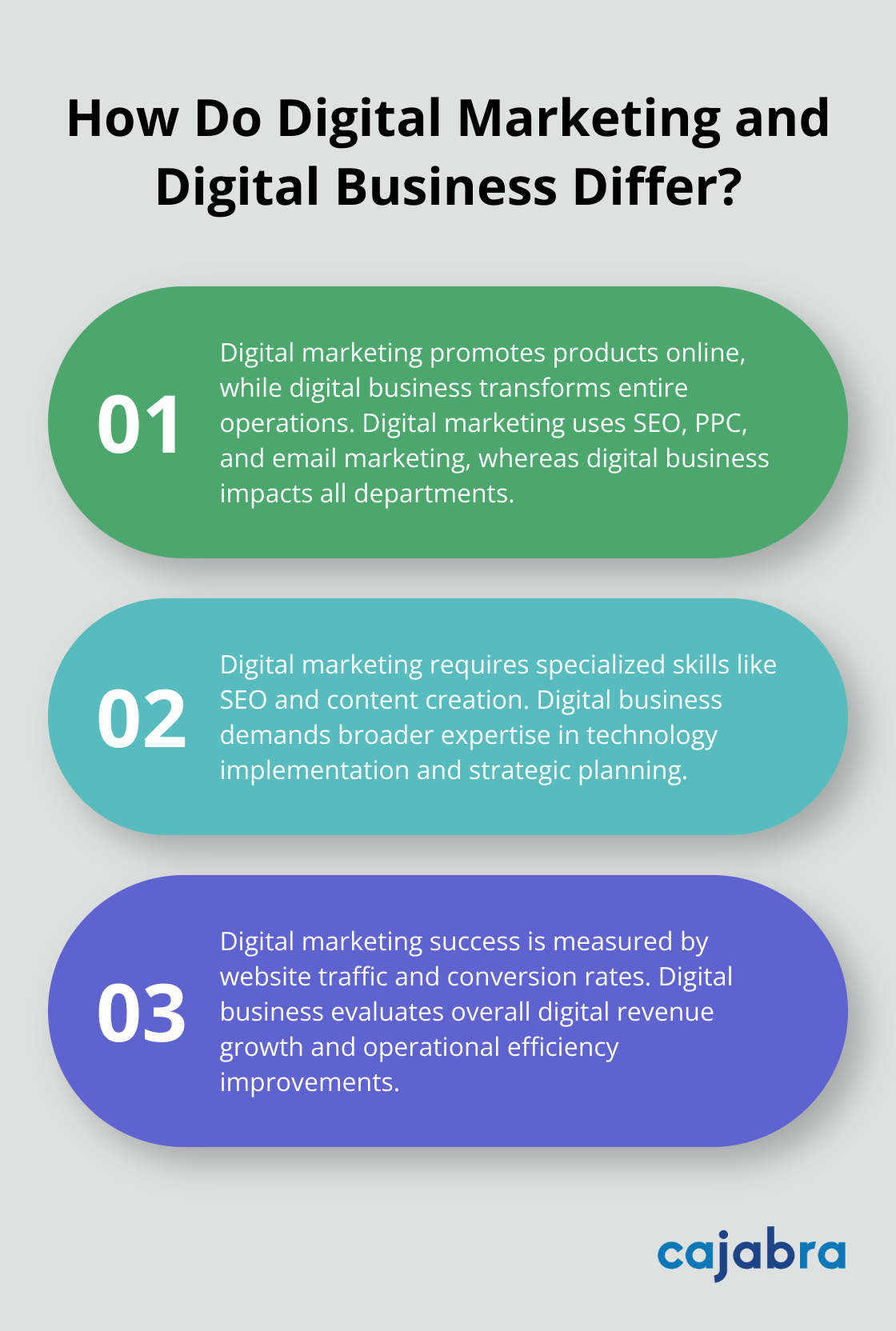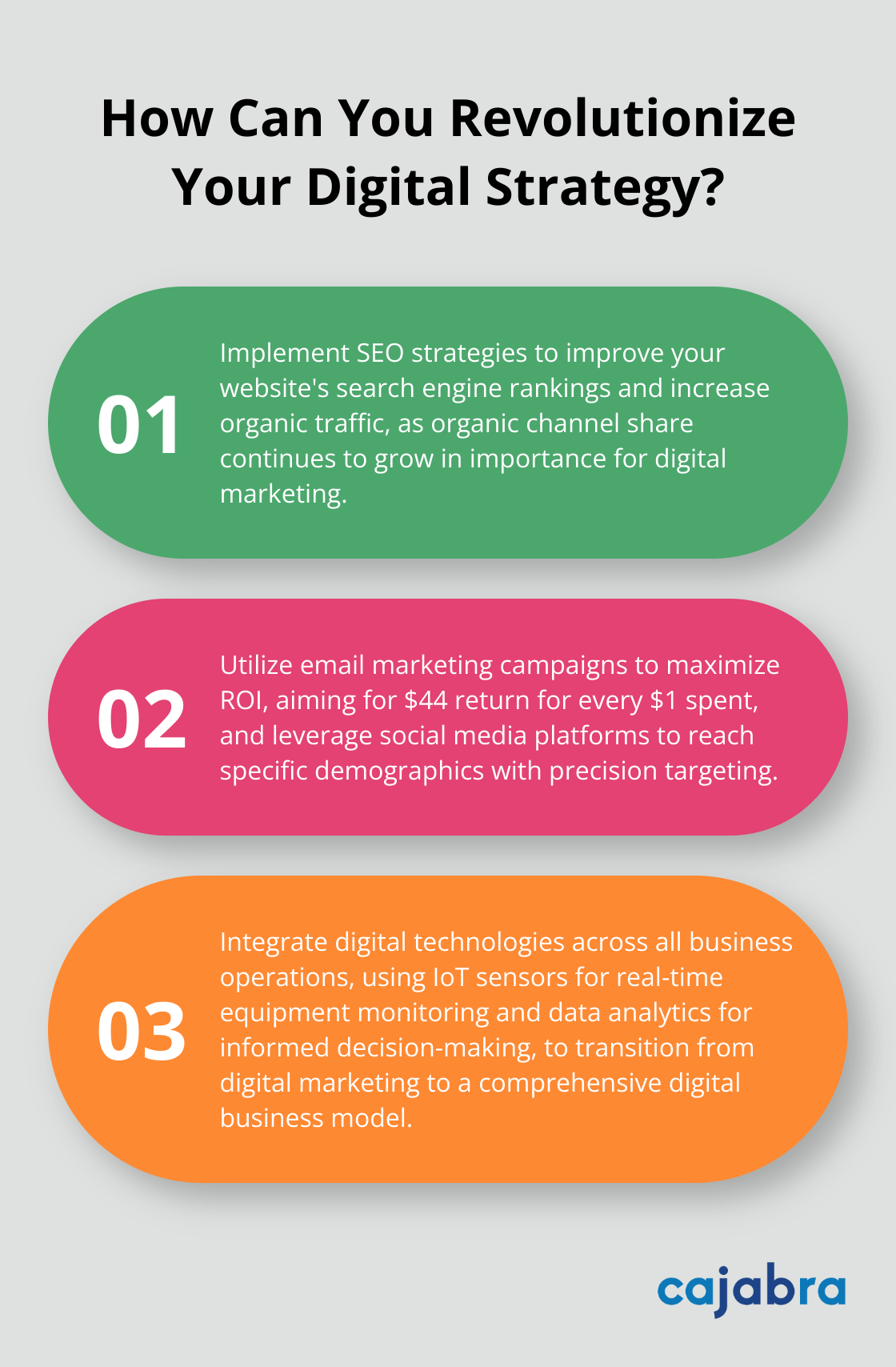
In the fast-paced world of online business, understanding the nuances between digital marketing and digital business is essential. At Cajabra, LLC, we often encounter confusion surrounding these two concepts.
While they're interconnected, digital marketing and digital business have distinct focuses and impacts on an organization's overall strategy. This post will clarify the key differences, helping you navigate the digital landscape more effectively.
Digital marketing promotes products, services, or brands through digital channels. It connects businesses with potential customers in their online environments.
Search Engine Optimization (SEO) forms the cornerstone of many digital marketing strategies. It optimizes website content to achieve higher rankings in search engine results pages. As organic channel share continues to increase, SEO becomes more important to digital marketing.

Content marketing creates and distributes valuable, relevant content to attract and retain a specific audience. The Content Marketing Institute notes that this approach generates about three times as many leads as traditional marketing while costing 62% less.
Digital marketing's strength lies in its measurability. Tools like Google Analytics provide detailed insights into campaign performance, allowing marketers to track key metrics (such as website traffic, conversion rates, and return on investment).
Email marketing demonstrates impressive results, with an average ROI of $44 for every $1 spent (according to Campaign Monitor). This makes it one of the most cost-effective digital marketing tactics available.
Social media marketing has become indispensable, with over 4.48 billion people using social media worldwide as of 2021 (Statista). Platforms like Facebook, Instagram, and LinkedIn offer powerful targeting options, allowing businesses to reach specific demographics with precision.
Digital marketing strategies aim to increase brand awareness, generate leads, and drive sales. These objectives must adapt to evolving consumer behaviors. For example, mobile optimization has become essential, delivering a more enjoyable and seamless browsing experience resulting in longer visit durations, lower bounce rates, and higher conversion rates.
Pay-per-click (PPC) advertising, such as Google Ads, displays ads to motivated buyers at the exact moment they search for related products or services. This targeted approach yields quick results, making it an attractive option for businesses that want to generate immediate traffic and conversions.
As we explore the concept of digital business, it becomes clear that while digital marketing focuses on promotion and customer acquisition, digital business encompasses a broader transformation of how companies operate in the digital age.
Digital business transcends mere online presence or digital marketing efforts. It represents a fundamental shift in how companies operate, leveraging technology to create value, generate revenue, and optimize processes across the entire organization.
At its core, a digital business incorporates digital technologies into all areas of operation. This integration affects everything from internal processes to customer interactions. A manufacturing company might use Internet of Things (IoT) sensors to monitor equipment performance in real-time, predicting maintenance needs before breakdowns occur.
Digital businesses thrive on data. They collect, analyze, and act on vast amounts of information to make informed decisions. A study by McKinsey reveals that companies using customer analytics comprehensively are more likely to generate above-average profits. This data-centric approach enables businesses to personalize customer experiences, optimize supply chains, and identify new market opportunities.
Digital businesses adapt quickly to market changes. They often employ agile methodologies, allowing them to pivot strategies rapidly in response to new data or customer feedback. Netflix exemplifies this adaptability, transitioning from a DVD rental service to a streaming giant (and now a content producer), all driven by data-informed decisions.
The objectives of digital businesses extend beyond profit maximization. They aim to create seamless, omnichannel experiences for customers, improve operational efficiency, and foster innovation. A survey by Gartner found that 56% of CEOs reported digital improvements led to revenue growth.

Advantages of embracing a digital business model are significant. Companies report increased productivity, with some seeing up to a 40% reduction in operational costs through process automation. Customer satisfaction often improves as well; Salesforce reports that 84% of customers say the experience a company provides is as important as its products or services.
For accounting firms considering the shift to a more digital business model, services like those offered by Cajabra can prove instrumental. The JAB System™ helps accountants leverage digital tools and strategies to secure retainer-based clients and optimize their online presence, aligning perfectly with the principles of digital business transformation.
As we explore the key differences between digital marketing and digital business in the next section, it becomes clear that while digital marketing remains a crucial component, true digital businesses embrace technology at every level, creating new value propositions and revolutionizing entire industries in the process.
Digital marketing promotes products or services through online channels. It focuses on activities like search engine optimization (SEO), pay-per-click (PPC) advertising, email marketing, and more.

Digital business, however, transforms an organization's entire operations and strategy. It extends beyond marketing to include product development, supply chain management, and customer service. Current research maps the thematic evolution of digital transformation in business and management.
Digital marketing strategies typically affect marketing and sales departments. Digital business transformation, on the other hand, leads to extensive changes across all departments. A company adopting a digital business model might restructure its entire workflow, implement new technologies company-wide, and retrain employees in various departments.
Digital marketing requires specialized skills in areas such as SEO, content creation, and social media management. The Digital Marketing Institute emphasizes the importance of data analysis and consumer behavior understanding for effective digital marketing.
Digital business demands a broader skill set. It requires expertise in technology implementation, change management, and strategic planning.
Companies measure digital marketing success through metrics like website traffic, conversion rates, and return on ad spend. Tools like Google Analytics provide detailed insights into these performance indicators.
Digital business success requires a more holistic evaluation. Key performance indicators might include overall digital revenue growth, operational efficiency improvements, and customer lifetime value.
Digital marketing enhances existing business models by improving customer acquisition and retention. It often operates within the framework of traditional business structures.
Digital business, however, can fundamentally alter business models. It may create new revenue streams, change how products or services are delivered, or even redefine the company's core value proposition.
Digital marketing and digital business serve distinct purposes in the modern business ecosystem. Digital marketing promotes products and services through online channels, while digital business transforms an organization's operations with technology. These concepts complement each other, creating a synergy that propels businesses to new heights of success in the digital landscape.

We expect continued convergence between digital marketing and digital business as technologies advance. This integration will lead to more personalized marketing efforts and optimized operations, resulting in seamless customer experiences and efficient business processes. Companies that understand and leverage both digital marketing and digital business position themselves for sustained growth in an increasingly digital world.
For accounting firms navigating this digital landscape, Cajabra offers valuable services. The JAB System™ helps accountants secure retainer-based clients and optimize their online presence, effectively bridging the gap between digital marketing and digital business transformation. Businesses that embrace both concepts will find themselves well-equipped to thrive in the ever-evolving digital marketplace.



